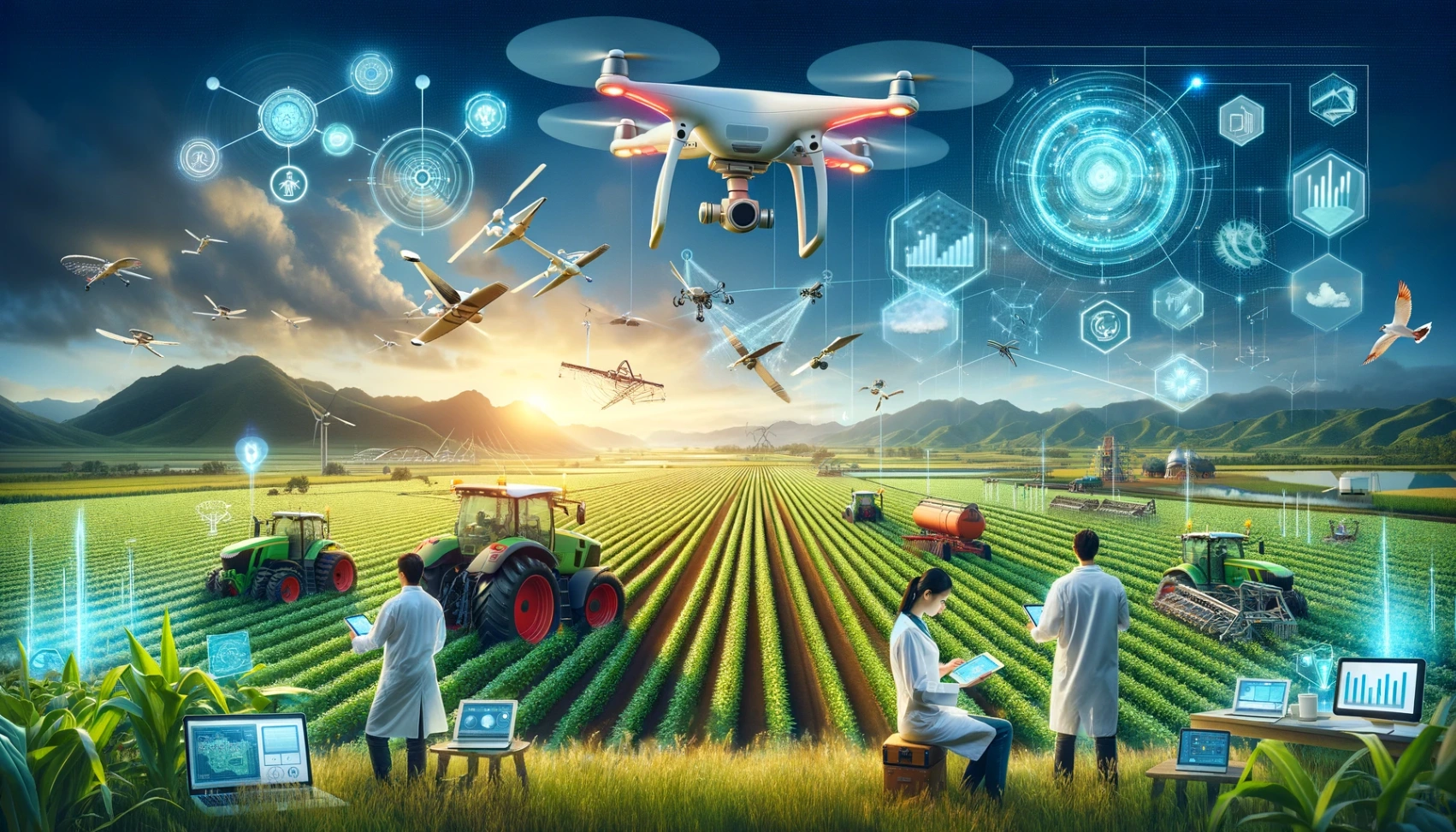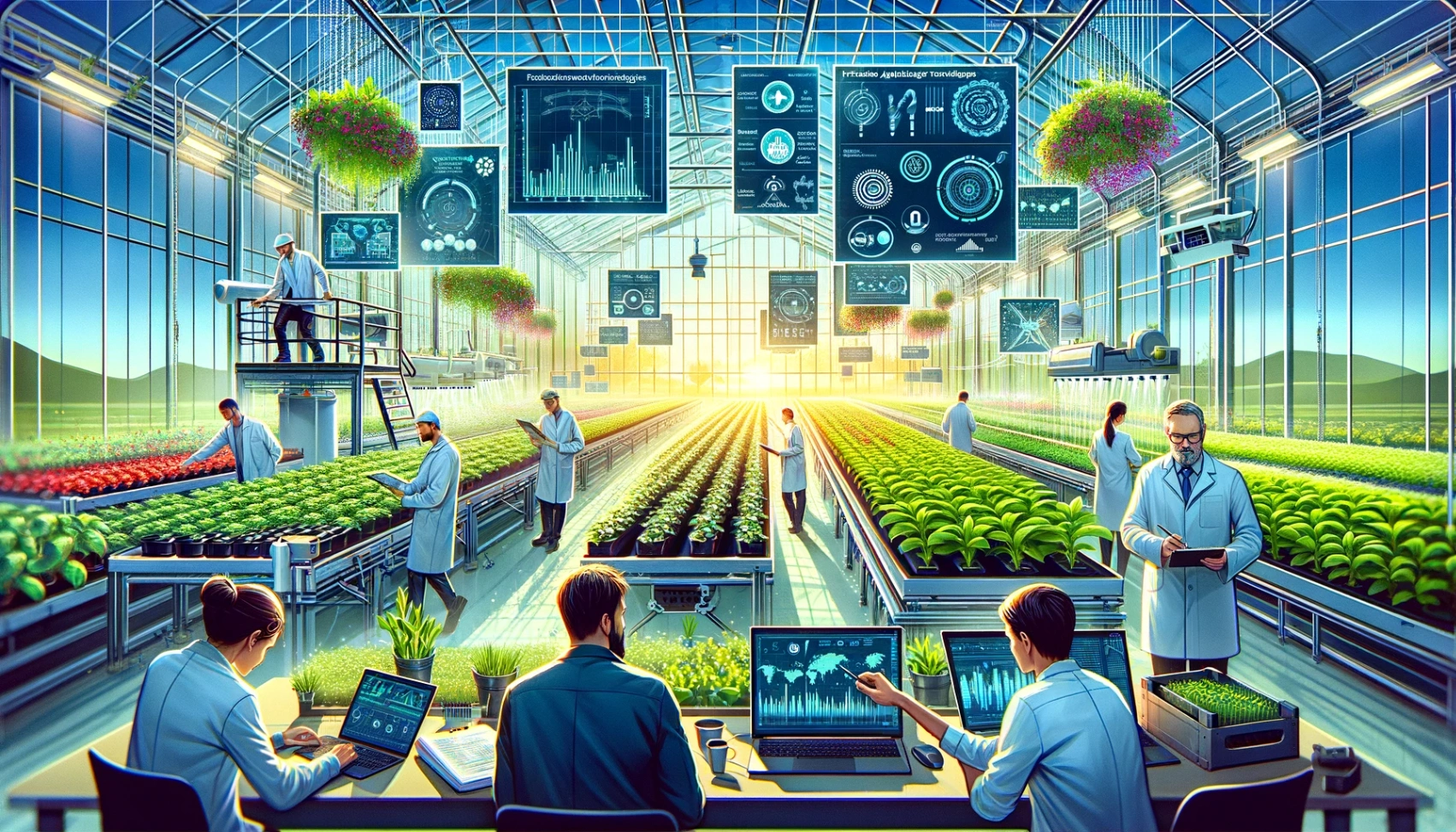Precision agriculture technologies have transformed modern farming. To succeed in this field, you need a diverse skill set.
From technical prowess to effective communication, these skills are crucial for thriving in precision agriculture jobs.
Understanding Precision Agriculture Technologies
Precision agriculture uses advanced data to improve agricultural practices.
It involves collecting and analyzing soil variability, weather patterns, and crop health data to make informed decisions.
By applying precise interventions, such as targeted fertilization and irrigation, farmers can maximize yields while minimizing input costs and environmental impact.

Essential Components and Technologies Involved
Various key components and technologies in precision agriculture enhance farming practices and improve crop yields.
Here are essential components and technologies integral to precision agriculture:
- GPS Technology: Provides accurate location tracking for farming equipment.
- GIS Software: Enables spatial analysis and mapping of agricultural data.
- Remote Sensing Tools: Capture aerial imagery for monitoring crop health and soil conditions.
- Precision Farming Equipment: Guides precise application of inputs based on location-specific data.
- Soil and Moisture Sensors: Collect real-time data on soil conditions for informed decisions.
- Variable Rate Technology: Adjusts input application rates to optimize resource use.
- Data Management Platforms: Organize and analyze agricultural data for improved farm management.
The Role of Data Analytics, IoT, Drones, and AI in Precision Agriculture
In precision agriculture, Data Analytics, IoT, Drones, and AI are vital in improving farming practices.
Here’s how each contributes to the advancement of precision agriculture:
- Data Analytics: Analyzes agricultural data to derive insights for informed decision-making.
- IoT (Internet of Things): Connects farming equipment and sensors to gather real-time data on crop conditions and environmental factors.
- Drones: Capture aerial imagery to monitor crop health, detect pests and diseases, and assess field conditions.
- AI (Artificial Intelligence): Applies algorithms for data analysis and automation in precision agriculture, including irrigation and pest control.
Technical Skills
In the realm of precision agriculture technologies, technical proficiency is paramount. Here are the critical technical skills essential for success in this field:
- Data Analysis and Interpretation: Analyzing agricultural data for insights.
- Proficiency in GIS (Geographic Information Systems) Software: Skill using GIS for spatial analysis.
- Mastery of Precision Agriculture Hardware and Software: Expertise in operating precision farming equipment.
- Knowledge of Remote Sensing Technologies: Understanding of satellite imagery for crop monitoring.
Agricultural Knowledge
A solid understanding of agricultural principles is essential for effectively implementing precision agriculture technologies.
Here are seven key areas of agricultural knowledge crucial for success in this field:
- Agronomy and Crop Science Principles: Understanding plant biology and factors affecting crop yield.
- Soil Science and Fertility Management: Knowledge of soil properties and nutrient optimization techniques.
- Crop Monitoring Techniques: Familiarity with tools for assessing crop health and growth.
- Pest and Disease Management: Ability to control pests and diseases sustainably.
- Irrigation Management: Skill inefficient water use for crop irrigation.
- Crop Rotation and Diversification: Benefits of rotating and diversifying crops for soil health.
- Sustainable Agriculture Practices: Awareness of eco-friendly farming methods.
Communication Skills
Practical communication skills are vital for success in precision agriculture, fostering collaboration and clarity in conveying complex information.
Here are essential communication skills crucial for navigating this field:
- Convey Technical Information: Communicate complex concepts.
- Collaboration Skills: Work effectively in interdisciplinary teams.
- Clear Written Communication: Produce concise reports and documentation.
- Active Listening: Pay close attention to others’ perspectives.
- Presentation Skills: Deliver engaging and informative presentations.
- Interpersonal Communication: Build strong relationships with colleagues and clients.
- Adaptability in Communication: Tailor communication style to different audiences.
Problem-Solving Skills
In precision agriculture, strong problem-solving skills are essential for overcoming challenges and improving practices.
Here are seven critical aspects of problem-solving skills crucial for success in this field:
- Critical Thinking: Analyzing problems systematically to identify practical solutions.
- Adaptability: Flexibility in adjusting strategies to changing circumstances.
- Innovation: Generating creative ideas to overcome obstacles.
- Attention to Detail: Ensuring thoroughness in problem assessment and resolution.
- Decision-Making: Making sound judgments based on available information.
- Resourcefulness: Utilizing available resources efficiently to solve problems.
- Persistence: Maintaining determination to overcome obstacles and achieve goals.
Business and Management Skills
In precision agriculture technologies, proficiency in business and management skills is crucial for effectively overseeing operations and driving success.
Here are seven critical aspects of business and management skills essential for thriving in this field:
- Financial Literacy: Understanding budgets and financial planning.
- Project Management: Organizing and executing precision agriculture projects.
- Regulatory Compliance: Ensuring adherence to industry regulations and standards.
- Market Analysis: Evaluating market trends and opportunities.
- Supply Chain Management: Optimizing logistics and resource allocation.
- Strategic Planning: Setting long-term goals and objectives.
- Leadership: Inspiring and guiding teams toward achieving objectives.
Training and Education Paths for Precision Agriculture Careers
Various training and education paths lead to rewarding careers in the rapidly evolving field of precision agriculture.
Here are key pathways for individuals aspiring to enter the precision agriculture sector:
- Agricultural Science and Agronomy Programs: Comprehensive crop management and agricultural practices education.
- Technology and Engineering Degrees: Focus on agricultural applications within technology and engineering studies.
- Vocational Training: Hands-on learning in precision agriculture equipment operation and maintenance.
- Continuing Education: Ongoing courses in data analytics and precision farming technologies for professional development.

Career Opportunities in Precision Agriculture Technologies
In the dynamic field of precision agriculture technologies, those with the right skills and expertise can expect a wide array of career opportunities.
Here are some critical paths for individuals looking to pursue careers in this exciting sector:
Agricultural Technology Companies
- Positions in research and development for designing and improving precision agriculture tools.
- Opportunities in sales and marketing to promote and distribute cutting-edge agricultural technologies.
Agricultural Consulting Firms
- Roles in providing expert advice and guidance to farmers on implementing precision agriculture practices.
- Positions in data analysis and interpretation to optimize farming strategies and maximize yields.
Government Agencies and Research Institutions
- Careers in policy development and regulation related to precision agriculture technologies.
- Research positions focused on advancing and innovating agricultural technologies for sustainability and productivity.
Farm Management and Operations
- Jobs in managing and implementing precision agriculture systems on farms to enhance efficiency and profitability.
- Positions in data management and analysis to make informed crop management and resource optimization decisions.
Challenges and Future Trends in Precision Agriculture Technologies
Various challenges and future trends shape the trajectory of the industry in the ever-evolving landscape of precision agriculture technologies.
Here are key areas to consider:
- Data Integration and Management Challenges: Struggles with integrating and managing diverse data sources efficiently.
- Connectivity and Infrastructure Issues: Limited rural connectivity and infrastructure hinder technology deployment.
- Adoption and Education Hurdles: Farmer resistance to change and the need for comprehensive education programs.
- Sustainability and Environmental Concerns: Balancing benefits with environmental impacts, like increased energy usage.
- Emerging Technologies and Innovations: Rapid advancements in AI, machine learning, and robotics drive precision agriculture forward.
Summing It Up
In precision agriculture technologies, mastering critical skills is essential for success.
Technical, social and proactive abilities, these skills are crucial for navigating modern farming practices.
With technology advancements and sustainability demands, honing these skills drives personal success and industry innovation.
Also Read: Kako započeti karijeru u pozorišnoj produkciji: Korak-po-korak vodič
Also Read: The 10 Top Types Of Agricultural Technology Jobs
Read in another language
- Español: Habilidades clave que necesitas para tener éxito en trabajos de tecnologías de agricultura de precisión
- Bahasa Indonesia: Keterampilan Utama yang Anda Butuhkan untuk Sukses dalam Pekerjaan Teknologi Pertanian Presisi
- Bahasa Melayu: Kecekapan yang Perlu Anda Miliki untuk Berjaya dalam Pekerjaan Teknologi Pertanian Precision
- Čeština: Nejlepší dovednosti, které potřebujete k úspěchu v zaměstnání v technologiích precision agriculture
- Dansk: Top Færdigheder Du Har Brug for at Lykkes i Præcisionsjordbrugsteknologiarbejde
- Deutsch: Top Fähigkeiten, die Sie für den Erfolg in Präzisionslandwirtschaftstechnologie-Jobs benötigen
- Eesti: Tiposkused, mida vajate edukaks olemiseks täpsus põllumajandustehnoloogia töökohtadel
- Français: Les compétences essentielles pour réussir dans les emplois liés aux technologies de l’agriculture de précision
- Hrvatski: Vrhunske vještine koje su vam potrebne za uspjeh u poslovima tehnologija precizne poljoprivrede
- Italiano:
- Latviešu: Topprasmes, kas nepieciešamas, lai veiksmīgi darbotos precīzas lauksaimniecības tehnoloģijās
- Lietuvių: Topinės žemės ūkio technologijų darbų sėkmei reikalingos jūsų geriausios įgūdžiai
- Magyar: A Precíziós Mezőgazdasági Technológiák munkakörökben való sikeres szerepléshez szükséges legfontosabb készségek
- Nederlands: Top vaardigheden die je nodig hebt om succesvol te zijn in banen met precisielandbouwtechnologieën
- Norsk: Toppferdigheter du trenger for å lykkes i jobber innen presisjonsjordbruksteknologi
- Polski: Najważniejsze Umiejętności Potrzebne do Odnieścia Sukcesu w Pracy w Technologiach Precyzyjnej Rolnictwa
- Português: Principais habilidades que você precisa para ter sucesso em empregos de tecnologias de agricultura de precisão
- Română: Abilități de Top de care Ai Nevoie pentru a Reuși în Joburile cu Tehnologii Agricole de Precizie
- Slovenčina:
- Suomi: Taidot, jotka tarvitset menestyäksesi tarkkuusmaanviljelytekniikoiden työtehtävissä
- Svenska: Toppfärdigheter du behöver för att lyckas inom jobb inom precisionsjordbruksteknik
- Tiếng Việt: Những Kỹ Năng Cần Thiết để Thành Công trong Công Việc Công Nghệ Nông Nghiệp Chính Xác
- Türkçe: Hassas Tarım Teknolojileri İşlerinde Başarılı Olmak İçin Gereken En Önemli Beceriler
- Ελληνικά: Κορυφαίες Δεξιότητες που Χρειάζεστε για την Επιτυχία στις Θέσεις Εργασίας Τεχνολογιών Ακριβείας Αγροτικής Οικονομίας
- български: Най-важните умения, които ви трябват, за да успеете в работата с Технологиите за Прецизно Земеделие
- Русский: Топ навыков, необходимых для успешной карьеры в сфере технологий точного земледелия
- српски језик: Врхунске вештине које су вам потребне за успех у пословима технологија прецизне пољопривреде.
- עברית: כישורים מרכזיים שנדרשים להצלחה במשרות בטכנולוגיות חקלאות מדויקה
- اردو: پریسیژن زراعتی تکنولوجی کے وظائف میں کامیاب ہونے کیلئے آپ کو اہم ترجیحات
- العربية: المهارات الرئيسية التي تحتاجها للنجاح في وظائف تقنيات الزراعة الدقيقة
- فارسی: مهارتهای برتری که برای موفقیت در شغلهای فناوریهای کشاورزی دقیق لازم است
- हिन्दी: कृषि प्रौद्योगिकियों नौकरियों में सफलता पाने के लिए आपको चाहिए शीर्ष कौशल
- ภาษาไทย: ทักษะยอดเยี่ยมที่คุณต้องการสำเร็จในงานเทคโนโลยีการเกษตรที่แม่นยำ
- 日本語: 精密農業技術の仕事で成功するために必要なトップスキル
- 简体中文: 在精准农业技术岗位取得成功所需的顶尖技能
- 繁體中文: 在精準農業技術職位中取得成功所需的頂尖技能
- 한국어: 정밀 농업 기술 분야 취업에 성공하기 위해 필요한 TOP 기술




